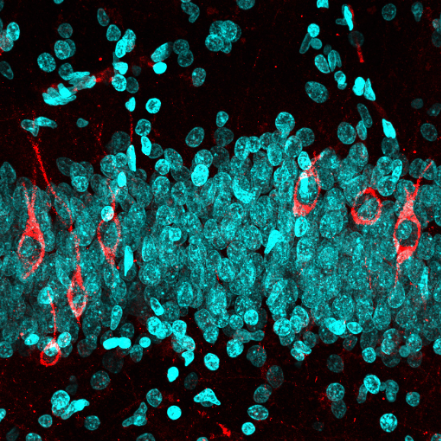 Neurobiology
Neurobiology
Hunting new-born neurons in the human adult brain
The continuous generation of new neurons during lifetime is crucial for learning and memory. In humans, we found a mild decrease in the number of these immature neurons through physiological aging and a dramatic reduction in Alzheimer´s disease accompanied by impairment in their maturation.

The hippocampus is a brain region tightly related to memory processing. This region hosts one of the most peculiar phenomena that occurs in the adult mammalian brain: the continuous generation of new neurons during a lifetime. This phenomenon is named adult hippocampal neurogenesis and is crucial for learning and memory. It confers an unparalleled degree of flexibility to the entire hippocampal region. Even though neurogenesis has been extensively characterized in rodents during the last decades, direct evidence in humans has remained elusive.
During the last decade, our laboratory has focused on studying human neurogenesis during physiological and pathological aging. In particular, we have studied a disease that severely targets the hippocampus: Alzheimer's disease (AD). Given the outstanding regenerative potential of generating new neurons during adulthood, determining the occurrence of this phenomenon in the human brain is a crucial question with remarkable therapeutic potential.
Among the scientific community, exist contradictory pieces of evidence, either supporting or questioning the occurrence of human neurogenesis. We aimed to determine whether methodological differences could underlie these discrepancies. We used post-mortem human brain samples obtained under tightly controlled conditions and state-of-the-art tissue processing methodologies. We analyzed the influence of these factors on brain samples collected from 13 neurologically healthy subjects (between 42 and 87 years of age) and 45 patients with AD. We analyzed the presence of immature neurons and how these cells mature in the human hippocampus during physiological and pathological aging.
Our results show the unambiguous detection of thousands of immature neurons in the human brain up to the tenth decade of life. Moreover, we confirmed our initial hypothesis that certain tissue processing methodologies completely abolished the detection of these cells. We concluded that our methods allow the unambiguous detection of neurogenesis markers. In contrast, formalin, the most commonly used fixative in brain banks worldwide, completely abolished their detection.
Importantly, we observed a decrease in the number of immature neurons through physiological aging. Moreover, we determined whether we could find immature neurons at distinct maturation stages in the human hippocampus. To this end, we have outlined the first proposed model of the maturation stages of neurogenesis in humans.
Next, we wondered whether AD could impair neurogenesis. Remarkably, our data revealed both a progressive reduction in the number of immature neurons and a dramatic impairment in their maturation. Importantly, these alterations are observed at the early stages of the disease, although we found a progressive worsening as the disease advances.
The use of the most suitable preservation and tissue processing methodologies have brought to light the existence of a dynamic population of immature neurons in the human brain throughout aging until the tenth decade of life. Despite a slight decrease in the number of immature neurons throughout aging, these cells go through different maturation stages during neurogenesis in humans. Finally, our data reveal a marked early and progressive reduction in the number of immature neurons, accompanied by an alteration in their maturation in patients with AD.
Our findings reveal that neurogenesis occurs and persists through life. Strikingly, our results highlight the importance of methodological aspects to detect this dynamic population of immature neurons in the brain. This message should be taken into account by future studies aimed to expand our current knowledge on this fascinating process that occurs in the human brain. Moreover, the putative detection of neurogenesis impairments might offer relevant biomarkers of disease progression. Finally, increasing neurogenesis in humans emerges as a potential therapeutic target for preventing or slowing down, neurodegenerative diseases.
Original Article:
Moreno-Jiménez E, Flor-García M, Terreros-Roncal J et al. Adult hippocampal neurogenesis is abundant in neurologically healthy subjects and drops sharply in patients with Alzheimer's disease. Nat Med. 2019;25(4):554-560.Next read: Evolution does not care by Thomas Wilhelm , Holger Richly
Edited by:
Massimo Caine , Founder and Director
We thought you might like
Hacking the tryptophan metabolic process to reduce neurodegeneration
Apr 25, 2017 in Health & Physiology | 3 min read by Carlo BredaCould we reverse memory loss in Alzheimer’s patients? Mice answer yes!
Mar 16, 2017 in Health & Physiology | 2.5 min read by Aude Marzo , Faye McLeod , Patricia SalinasThe power of our adaptive immunity against Alzheimer’s Disease
May 10, 2017 in Health & Physiology | 3 min read by Daniele GuidoAlzheimer’s: A New Approach to Treating an Old Disease
Apr 3, 2018 in Health & Physiology | 3.5 min read by Pamela MaherMore from Neurobiology
New, smaller-than-ever devices to help us understand how our brain works from the inside
Nov 8, 2024 in Neurobiology | 4 min read by Filippo DonatiCan we use a magnet to see brain inflammation?
Sep 25, 2023 in Neurobiology | 4 min read by Raquel Garcia-Hernandez , Santiago Canals , Silvia de SantisSurprising Behavior Changes in Genetically Modified Syrian Hamsters
Aug 30, 2023 in Neurobiology | 4 min read by Susan Lee , Kim Huhman , Jack TaylorTo achieve goals, we definitively need our neurons
Mar 10, 2023 in Neurobiology | 3.5 min read by Julien CourtinThe Impact of SARS-CoV-2 on the Brain: It Is All in Your Head
Feb 15, 2023 in Neurobiology | 3.5 min read by Meredith G. Mayer , Tracy FischerEditor's picks
Trending now
Popular topics


